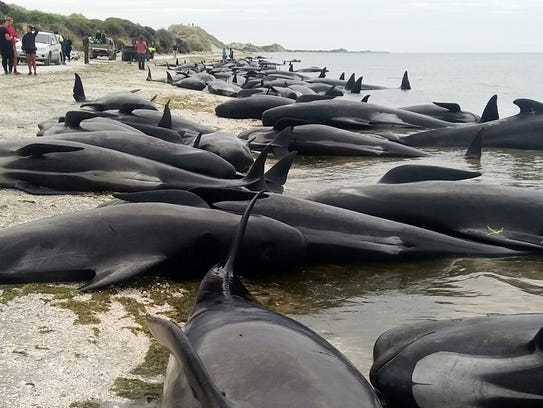The last 10th of February more than 400 whales had swum along the coastline of Farewell Spit, a New Zealand beach. Cheere Marrisoc, a magazine writer and editor, stumbled with the sound of cries and then saw the whales when he was going to capture the sunrise.
He said "You could hear the sounds of splashing, of blowholes being cleared, of sighing, the young ones were the worst. Crying is the only way to describe it."
When he found them, three-quarters of the whales were already dead. Morrison and his friends alerted the authorities, and soon began to arrive volunteers in wetsuits and carrying buckets. Morrison, dressed in his street clothes, waded in the water and tried to save as many whales as he could. Morrison said "I walked away crying my eyes out. We knew there were limited things we could do."
Some of the adult's and babies whale carcasses were found buried deeply under the sand with their tail still aloft.

He said "You could hear the sounds of splashing, of blowholes being cleared, of sighing, the young ones were the worst. Crying is the only way to describe it."
When he found them, three-quarters of the whales were already dead. Morrison and his friends alerted the authorities, and soon began to arrive volunteers in wetsuits and carrying buckets. Morrison, dressed in his street clothes, waded in the water and tried to save as many whales as he could. Morrison said "I walked away crying my eyes out. We knew there were limited things we could do."
The Department of Conservation said that about 300 volunteers had joined the conservation workers on the beach and they formed a human chain in the water to try to stop the whales from swimming back. When high tide came, they manage to refloat a dozen of the alive whales.
There are many theories that try to explain why whales strand themselves, like chasing a prey or trying to protect a member of the group, and seem like that once they get close to the sand it's difficult for them to return.
It isn't the first time that whales strand themselves in New Zealand, one of the highest rates of whale strandings in the world, in 1918 about 1000 whales swims back to the Chatham Islands and in 1985 about 450 whales stranded in Auckland.
A volunteer rescue said that a total of 416 whales had stranded and 75% were dead when they were discovered.

It is very sad that a lot of whales die pointlessly. From my point of view, the experts have to do research and find an answer to why they would behave this way and look for solutions, because it is not the first time that something similar to this event occurs in the same place, and has to have a logical answer for that. On the other hand, I'm glad that an amount of people offer their help and time to try to save these poor animals, I think that if everybody does of their part will make a better world.